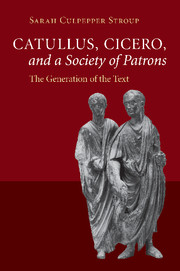Book contents
- Frontmatter
- Contents
- Preface and acknowledgments
- List of abbreviations
- Introduction
- I HOW TO WRITE ABOUT WRITING
- II THE TEXTUALIZATION OF DISPLAY
- 4 The problem with liberal performance
- 5 From public display to textual display
- 6 The poetics of literary obligation
- III THE MATERIALIZATION OF THE TEXT
- Epilogue
- Appendix: What “Society of Patrons”? A prosopography of the players
- Bibliography
- Index locorum
- Index rerum et nominum
5 - From public display to textual display
Published online by Cambridge University Press: 04 August 2010
- Frontmatter
- Contents
- Preface and acknowledgments
- List of abbreviations
- Introduction
- I HOW TO WRITE ABOUT WRITING
- II THE TEXTUALIZATION OF DISPLAY
- 4 The problem with liberal performance
- 5 From public display to textual display
- 6 The poetics of literary obligation
- III THE MATERIALIZATION OF THE TEXT
- Epilogue
- Appendix: What “Society of Patrons”? A prosopography of the players
- Bibliography
- Index locorum
- Index rerum et nominum
Summary
TIROCINIUM FORI AND THE MAKING OF MEN
At least as early as the final decades of the Republic, oratory was constructed as an androgenic phenomenon. Just as oratory originates from men, so too does it make them, and an essential part of this process was the so-called tirocinium fori: that ritual of forensic recruitment and training – we might think of an apprenticeship – that included the donning of the toga uirilis (the “toga of manhood”) and the transfer of upper-class young boys from the tutelage of one adult male guardian (usually the father) to another (usually a family friend or colleague), as Cicero describes in this passage of the pro Caelio:
[pater] ut huic uirilem togam dedit – nihil dicam hoc loco de me…hoc dicam, hunc a patre continuo ad me esse deductum; nemo hunc M. Caelium in illo aetatis flore uidit nisi aut cum patre aut mecum aut in M. Crassi castissima domo…
(Cael. 9 (56 BCE))As [his father] gave the young Marcus the toga uirilis – I'll not mention my own involvement…but I will say this: his father transferred the young boy to me, straightaway, and from that moment on no one ever saw Marcus Caelius, in those rosy years of his youth, but with his father, or with me, or in the most irreproachable company of Marcus Crassus…
- Type
- Chapter
- Information
- Catullus, Cicero, and a Society of PatronsThe Generation of the Text, pp. 141 - 167Publisher: Cambridge University PressPrint publication year: 2010

